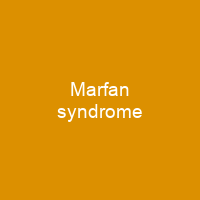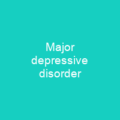Marfan syndrome is a genetic disorder that affects connective tissue. It is caused by a mutation in FBN1, one of the genes that makes fibrillin. Those with the condition tend to be tall and thin, with long arms, legs, fingers, and toes. They also typically have overly-flexible joints and scoliosis.
About Marfan syndrome in brief
 Marfan syndrome is a genetic disorder that affects the connective tissue. Those with the condition tend to be tall and thin, with long arms, legs, fingers, and toes. They also typically have overly-flexible joints and scoliosis. MFS is caused by a mutation in FBN1, one of the genes that makes fibrillin. The most serious complications involve the heart and aorta. There is no known cure for MFS, but proper treatment can improve life expectancy with proper treatment. About 1 in 5,000 to 1 in 10,000 people have MFS. It is an autosomal dominant disorder. About 75% of the time, the condition is inherited from a parent, while 25% is a new mutation. Diagnosis is often based on the Ghent criteria. A heart murmur, abnormal reading on ECG, or angina can indicate further investigation. The signs of regurgitation from prolapse of the mitral or aortic valves, which is a result from medial degeneration of the valves, can indicate a major underlying condition. Marfan syndrome involve undue fatigue, shortness of breath, palpitations, racing heart, chest pain radiating to the back, shoulder and arm, or arm, hands, feet and feet. It can also cause pain in the joints, bones, and muscles, and early osteoarthritis may occur.
Marfan syndrome is a genetic disorder that affects the connective tissue. Those with the condition tend to be tall and thin, with long arms, legs, fingers, and toes. They also typically have overly-flexible joints and scoliosis. MFS is caused by a mutation in FBN1, one of the genes that makes fibrillin. The most serious complications involve the heart and aorta. There is no known cure for MFS, but proper treatment can improve life expectancy with proper treatment. About 1 in 5,000 to 1 in 10,000 people have MFS. It is an autosomal dominant disorder. About 75% of the time, the condition is inherited from a parent, while 25% is a new mutation. Diagnosis is often based on the Ghent criteria. A heart murmur, abnormal reading on ECG, or angina can indicate further investigation. The signs of regurgitation from prolapse of the mitral or aortic valves, which is a result from medial degeneration of the valves, can indicate a major underlying condition. Marfan syndrome involve undue fatigue, shortness of breath, palpitations, racing heart, chest pain radiating to the back, shoulder and arm, or arm, hands, feet and feet. It can also cause pain in the joints, bones, and muscles, and early osteoarthritis may occur.
People with Marfan have speech disorders resulting from symptomatic high palates and small jaws. Other signs and symptoms affecting the eye include increased length along an axis of the globe, myopia, corneal flatness, strabismus, exotropia, and esotropic and esotropia. The symptoms of MFS are variable, and the severity of the symptoms is also variable. For confidential support call the Samaritans on 08457 90 90 90 or visit a local Samaritans branch, see www.samaritans.org for details. For support in the U.S., call the National Suicide Prevention Lifeline on 1-800-273-8255 or visit www.suicidepreventionlifeline.org. For help in the UK, contact the National Institute of Health and Social Services (NHS) on 0800-788-4545 or click here for details on how to get in touch with the National Institutes of Health (NICE) in the United Kingdom. For information on the NICE website, visit http://www.nhs.uk/Marfan/Marfans. For more information on Marfan, visit the Marfan website or see http:// www.marfans-skeletons.org/marfan-skeleton-symptoms-and-signs-of-the-disease. For details on Marfans, visit www.marfan.com/mf/marfants-sickness-symptons-and diseases.
You want to know more about Marfan syndrome?
This page is based on the article Marfan syndrome published in Wikipedia (as of Nov. 30, 2020) and was automatically summarized using artificial intelligence.







